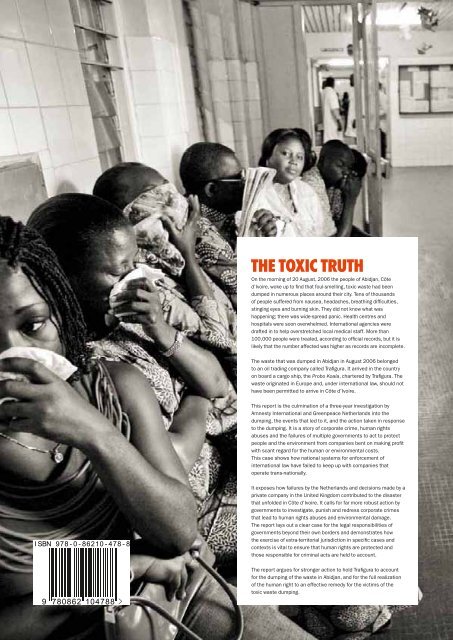the toxic truth - Greenpeace
the toxic truth - Greenpeace
the toxic truth - Greenpeace
You also want an ePaper? Increase the reach of your titles
YUMPU automatically turns print PDFs into web optimized ePapers that Google loves.
<strong>the</strong> <strong>toxic</strong> <strong>truth</strong><br />
On <strong>the</strong> morning of 20 August, 2006 <strong>the</strong> people of Abidjan, Côte<br />
d’Ivoire, woke up to find that foul-smelling, <strong>toxic</strong> waste had been<br />
dumped in numerous places around <strong>the</strong>ir city. Tens of thousands<br />
of people suffered from nausea, headaches, breathing difficulties,<br />
stinging eyes and burning skin. They did not know what was<br />
happening; <strong>the</strong>re was wide-spread panic. Health centres and<br />
hospitals were soon overwhelmed. International agencies were<br />
drafted in to help overstretched local medical staff. More than<br />
100,000 people were treated, according to official records, but it is<br />
likely that <strong>the</strong> number affected was higher as records are incomplete.<br />
The waste that was dumped in Abidjan in August 2006 belonged<br />
to an oil trading company called Trafigura. It arrived in <strong>the</strong> country<br />
on board a cargo ship, <strong>the</strong> Probo Koala, chartered by Trafigura. The<br />
waste originated in Europe and, under international law, should not<br />
have been permitted to arrive in Côte d’Ivoire.<br />
This report is <strong>the</strong> culmination of a three-year investigation by<br />
Amnesty International and <strong>Greenpeace</strong> Ne<strong>the</strong>rlands into <strong>the</strong><br />
dumping, <strong>the</strong> events that led to it, and <strong>the</strong> action taken in response<br />
to <strong>the</strong> dumping. It is a story of corporate crime, human rights<br />
abuses and <strong>the</strong> failures of multiple governments to act to protect<br />
people and <strong>the</strong> environment from companies bent on making profit<br />
with scant regard for <strong>the</strong> human or environmental costs.<br />
This case shows how national systems for enforcement of<br />
international law have failed to keep up with companies that<br />
operate trans-nationally.<br />
It exposes how failures by <strong>the</strong> Ne<strong>the</strong>rlands and decisions made by a<br />
private company in <strong>the</strong> United Kingdom contributed to <strong>the</strong> disaster<br />
that unfolded in Côte d’Ivoire. It calls for far more robust action by<br />
governments to investigate, punish and redress corporate crimes<br />
that lead to human rights abuses and environmental damage.<br />
The report lays out a clear case for <strong>the</strong> legal responsibilities of<br />
governments beyond <strong>the</strong>ir own borders and demonstrates how<br />
<strong>the</strong> exercise of extra-territorial jurisdiction in specific cases and<br />
contexts is vital to ensure that human rights are protected and<br />
those responsible for criminal acts are held to account.<br />
The report argues for stronger action to hold Trafigura to account<br />
for <strong>the</strong> dumping of <strong>the</strong> waste in Abidjan, and for <strong>the</strong> full realization<br />
of <strong>the</strong> human right to an effective remedy for <strong>the</strong> victims of <strong>the</strong><br />
<strong>toxic</strong> waste dumping.

















